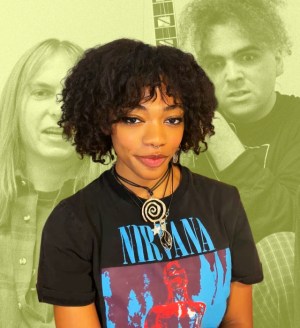Music + Culture
SHOWS
Covers Books
EVENTS
FEATURED
BRANDS
TRAVEL,
DRINKS & EATS
DRINKS & EATS
Latest
Heineken House Is Bringing Wale, Sean Paul, Big Boi, And More To Coachella 2026
Coachella is one of the biggest festivals in the world. It's so big, in fact, that there's at least one festival happening within the festival, as Heineken is once again hosting Heineken House at Coachella 2026. The show runs for all three days of both weekends, from April 10 to 12 and 17 to 19, and is led by Wale, Sean Paul, and Big Boi, as well as Coi Leray, Motion City Soundtrack, and plenty of others. If you're already at Coachella, there's no additional cost to visit Heineken Hous. Guilherme de Marchi Retz, Marketing VP of Heineken at Heineken…
Harry Styles Lands His Third No. 1 Single As ‘Aperture’ Debuts On Top Of The Hot 100 Chart
After a few years of staying largely out of the spotlight, Harry Styles returned in a big way with the new single "Aperture," from his upcoming album Kiss All The Time. Disco, Occasionally.. Clocking in at over five minutes, many of which are more of a slow burn than an in-your-face pop banger moment, the song doesn't exactly follow the big pop single formula. It's Harry Styles and it's a strong song, though, so it worked anyway: On the new Billboard Hot 100 chart dated February 7, "Aperture" debuts at No. 1. The song is Styles' third chart-topper, following "Watermelon…
Hayley Williams’ New Band Power Snatch Unexpectedly Drops Its Debut Release, ‘EP1’
Hayley Williams was all over the 2026 Grammys last night (February 1) as she had four nominations: Best Rock Performance for "Mirtazapine," Best Rock Song for "Glum," Best Alternative Music Performance for "Parachute," and Best Alternative Music Album for Ego Death At A Bachelorette Party. She came up empty, unfortunately, but she doesn't seem too bummed about it. In an Instagram post, she wrote, "We’d like to thank the academy. (And it’s an honor to lose to The Cure anytime) Love, Hayley Williams, Daniel James & Steph Marziano." In the photo, those three are all standing with their hands up…
The Best Physical Media Releases Of January 2026
Streaming services are the primary way a lot of people consume their media of choice, whether that be music or TV shows or movies. Not everybody is on board, though, and some who are are getting tired of it. Regular price increases and limited streaming libraries have some consumers returning to physical media, preferring vinyl and CDs and DVDs and more, objects they can hold and own without fear of losing access, either in conjunction or instead of streaming options. Companies are more than happy to support this wave: Whatever you might be into, each month brings a slew of…
Sombr, Alex Warren, And The Rest Of The Best New Artist Nominees Joined Forces For A 2026 Grammys Medley
The slate of performers at last night's (February 1) 2026 Grammy Awards was a big one. Bruno Mars was one of the evening's highlights, but so too was every Best New Artist nominee, as they all performed during a special section of the broadcast. It started with The Marías performing "Nobody New" (here's a video), then Addison Rae danced her way through "Fame Is A Gun" (video). Katseye got some dancing in, too, with "Gnarly" (video), then it was Leon Thomas' turn to do his breakout hit "Mutt" (video). Alex Warren then busted out "Ordinary" (video) before Lola Young took…
Bruno Mars Owned The 2026 Grammys With Two Performances, Including A Rosé Reunion
It's a good time to be Bruno Mars right now. His and Rosé's "APT." was one of 2025's biggest songs and his recent single "I Just Might" is No. 1 on the Hot 100. A few days ago, he was also the final name added to the performance lineup at this past weekend's 2026 Grammy Awards. The ceremony went down last night (February 1) and Mars was all over it. At the top of the show, he reunited with Rosé for a riveting rendition of "APT." (here's a video), which say Mars lean into his musicality and rip a guitar…
Uproxx’s Jeremy Hecht Discusses J. Cole’s Final Goal Before Retiring
J. Cole is days away from releasing his latest album, The Fall-Off, on February 6. The way Uproxx's Jeremy Hecht sees it, he thinks Cole is retiring after this project, but he hopes to do so having accomplished one final goal. https://www.instagram.com/p/DT55c4IjhcA/ In a new video, Hecht starts, "We all know that Cole dropped out of the battle with Drake and Kendrick, and with that, he did give up his ability to gain the crown as the greatest rapper alive. Some people like Fat Joe can't even listen to his upcoming project, and I think that's stupid: I'm excited for…
Bruno Mars Is The Final Name Added To The 2026 Grammys Performance Lineup
In recent days, the Recording Academy has been gradually rolling out its list of performers for the 2026 Grammy Awards (set to air on February 1). Today (January 30), days before the ceremony, they added one more name to the list: Bruno Mars. As Billboard notes, he's the last performer that will be announced. He joins a performance lineup that also includes Addison Rae; Alex Warren; Andrew Watt; Brandy Clark; Chad Smith; Clipse; Duff McKagan; Justin Bieber; KATSEYE; Lady Gaga; Leon Thomas; Lola Young; Lukas Nelson; Ms. Lauryn Hill; Olivia Dean; Pharrell Williams; Post Malone; Reba McEntire; Rosé; Sabrina Carpenter;…
The Grammys Should Catch Up To PinkPantheress
In 2025, we received exceptional projects from Black women in electronic dance music: Kelela equipping her talents for an enchanting jazz-filled live album, hypnotic club grooves from Rochelle Jordan, Amaarae's ode to Black diasporic dance music, Sudan Archives' sensual fusion of techno and house, two albums by FKA Twigs for the pregame/afters, and keiyaA's layered experimental sophomore album. These projects are often applauded by other Black women and femmes while simultaneously acknowledging the reclamation of dance music's inherently Black roots. In the music industry, Black women have to work twice as hard to bend the limitations of genres, and that…
These Essential Latin Music Video Directors Are Driving A Creative Revolution
As music approaches language and genre-fluid territory, those working behind the scenes are as essential to the process as the artists themselves. Latin music has long served as an outlet for both emotion and celebration, and visuals for artists like Bad Bunny, Omar Apollo, and Karol G have proven to be equally powerful. Many of these artists have remained with their visual collaborators for years, displaying excellent creative chemistry. As these musicians' creativity evolves, the directors of their music videos have grown alongside the singers' and rappers' craft. Consistency is a key component of Latinidad and work ethic, and below,…
Hayley Williams Is Indefatigable As She Launches Another New Project, A Band Called Power Snatch
Hayley Williams has been going pretty much nonstop the past few years. Paramore dropped their latest album, This Is Why, in 2023. The band spent some of that year and next opening for Taylor Swift on The Eras Tour. In 2025, she released a series of singles that ended up comprising the album Ego Death At A Bachelorette Party. Well, new year, new project: Williams just unveiled a new band, Power Snatch. It's a duo and the collaborator is a familiar one: Daniel James, who was heavily involved in writing and producing Ego Death At A Bachelorette Party. So far,…
The Emotionally Heavy (And Likeable!) Indie Rock Of Ratboys
If you know anything about the Chicago indie-rock band Ratboys, it probably concerns their likeability. Ratboys are a likeable band. They are likeable because they make really good music, and they are likeable because they have made really good music consistently over the course of 11 years and six albums. (Their latest, Singin' To An Empty Chair, arrives February 6.) But they are also likeable because they work hard, they travel pretty much anywhere and everywhere, and they do their jobs with kindness and professionalism. They are likeable the way your mailman is likeable. The "Ratboys are likeable" narrative is…
Uproxx’s Baylee Lefton Shares Songs For Sipping Margaritas On The Coast With Her Latest Playlist
Keeping up with music news and resources like Spotify's giant and regularly updated New Music Friday playlist are great ways to keep your listening habits from getting stale. Sometimes, though, you need a deeper dive. That's where Uproxx's Baylee Lefton comes in as she routinely offers quick-hit lists of songs you need to add into your rotation this week. She just delivered a fresh mix and it's full of songs for sipping margaritas on the coast. https://www.instagram.com/p/DT3iS38kvmN/ What does that mean? "Think beachy, smooth, and tropical," as Baylee puts it. The mix includes Reyna Tropical's "Cartagena" and "No Me Quieres,"…
Uproxx’s Joypocalypse Explains Why Melvins Deserve More Credit
Melvins were a key force in rock music beginning in the '80s. Specifically, their influence on grunge and sludge metal is incalculable. Despite forming in 1983, they're still around today, and so are legions of artists who took inspiration from their distinct sound. As Uproxx's Joypocalypse notes, Melvins are one of those bands where hearing them makes you realize how much music traces back to them. https://www.instagram.com/p/DT_ISquEt0f/ She says: "They slowed everything down from the typical '80s hardcore punk speed, incorporating heavier riffs and grittier tones. With this shift, they were laying the groundwork for sludge, but also shaping the…
.idk. Links With Land Rover To Design His Own Custom Defender And Play New Music For Fans
Very few people in the world get to design their own car (Billie Eilish would really like to have a go). Now, .idk. is among them, as he just teamed up with Land Rover to make his own custom Defender design. He made great use of the vehicle by taking a test drive with fans as they listened to and discussed his latest project, e.t.d.s. A Mixtape by .idk.. This is all chronicled in a new video. It starts with .idk. in storyteller mode, explaining the meaning that parts of his past brought to this collaboration: "When I got out…
Benson Boone Does A Flip (And Ben Stiller Tries To) In A Hilarious New Super Bowl Commercial
Benson Boone isn't playing the Super Bowl Halftime Show yet, but in the meantime, he will have a presence at the big game this year via a new Spike Jonze-directed ad for Instacart, in which he stars alongside Ben Stiller. In the ad, Boone and Stiller play an '80s musical duo singing a song about Instacart. Boone does a backflip, which upsets Stiller, who feels like he's being upstaged. He tries a flip of his own, which doesn't go well. This sparks some on-stage conflict and a series of escalating flip attempts. Boone discussed the ad with Billboard, saying of…
King Princess Covers A Geese Song She Declares Is ‘Such A Lesbian Anthem’
Geese was one of 2025's hottest bands among critics and music fans. They've caught the attention of their peers, too, as King Princess just covered "Au Pays Du Cocaine" in the BBC Radio 1 Live Lounge. Her take on the track is a bit more upbeat than Geese's original. King Princess also chatted with BBC Radio 1 host Jack Saunders about why she chose to cover the song and she said, "That Geese song is such a lesbian anthem. I don't know if he [Winter] meant to write such a lesbian song, but it really is quite d***-centric." When asked…
Lizzo Is Playing Some Special Jazz Shows At The Blue Note Jazz Club In New York And LA
Lizzo is coming off a 2025 that saw her go all-in on rap with a new mixtape, My Face Hurts From Smiling. She also popped up on Cardi B's hotly anticipated second album. Now her 2026 is off to a busy start, as today (January 26), she announced a run of 12 shows at the Blue Note Jazz Club's New York and Los Angeles locations. The performances, happening in February and March, will feature jazz and flute arrangements of Lizzo's songs, made especially for these gigs. Ticket availability begins with an artist pre-sale starting January 28 at 10 a.m. local…
Charli XCX And Kylie Jenner Star In The Bold Video For A.G. Cook’s ‘The Moment’ Song ‘Residue’
Charli XCX's new movie The Moment isn't far now, with the film set to premiere nationwide on January 30. At the same time, A.G. Cook's score for the film will be released. In a teaser for both that and the film, he shared a new Charli-starring video for "Residue." The visual starts with Charli looking down the barrel of the camera with a cigarette in hand. The shot pushes out to reveal Charli standing on a sidewalk, at which point she drops the cig, puts on some sunglasses, and walks with an emphatic strut. She immediately makes her way to…
Billie Eilish’s 3D Concert Movie Release Date Has Been Pushed Back And James Cameron Explains Why
Hit Me Hard And Soft: The Tour (Live In 3D), Billie Eilish's concert film created alongside James Cameron, got its first trailer last month. At the time, the movie was set to arrive on March 20. That is no longer the case, as the release date has now been pushed back to May 8. In an Instagram post shared yesterday (January 26), Cameron shared photos of him and Eilish working on the movie and explained: "We're refining the cut; dialing in cool, new 3D tech; adding some special behind-the-scenes we know you'll love. HIT ME HARD AND SOFT: THE TOUR…
Uproxx’s Jarret Myer Talks Rawkus Records And More With will.i.am On The ‘Culture FYI’RS’ Podcast
UPROXX Studios Chief Visionary Officer will.i.am seems to always have a dozen balls in the air, whether he's helming Uproxx's Visionaries interview and performance series, making a new anthem for the Los Angeles Dodgers, or popping up on the ASAP Rocky album that just debuted at No. 1. He's also the co-founder of the AI-powered collaborative communication messaging platform FYI. There's an accompanying podcast, Culture FYI'RS, too, and on a recent episode, the guest was Jarret Myer, co-founder of influential hip-hop record label Rawkus Records and UPROXX Studios. In a chat with FYI Chief Growth Officer Julie Pilat, Myer discussed…
Kid Cudi Refuses To Rest As He Announces ‘The Rebel Ragers Tour’ For 2026
Kid Cudi fans have been eating over the past two years, during which time Cudi has released three albums: Insano, Insano (Nitro Mega), and Free. Now there's even more reason to get excited: Today (January 26), Cudi announced The Rebel Ragers Tour. The run stretches from April to June and will hit a bunch of North American cities. The tour features support from M.I.A., Big Boi, A-Trak, and more. Tickets will be available via an artist pre-sale starting January 27 at 10 a.m. local time. The general on-sale kicks off on January 30 at 10 a.m. local time. More information…
ASAP Rocky’s ‘Don’t Be Dumb’ Is Officially His First No. 1 Album In Over A Decade
Don't Be Dumb is ASAP Rocky's first new album in nearly ten years, since 2018's Testing. Now, it's his first chart-topping album in over a decade: On the new Billboard 200 chart dated January 31, Don't Be Dumb debuts at No. 1. This is thanks to 123,000 equivalent album units earned in the United States during the week ending January 22. It's his third album to debut at No. 1, following AT.LONG.LAST.A$AP in 2015 and LONG.LIVE.A$AP in 2013. Rihanna is pretty pumped about it, writing on X, "Just me here to let yall know my baby daddy got the NUMBER…
Kenia Os Is Pushing Latin Pop Towards A Fierce Future
Kenia Os is very much a pop star of the times. In the past few years, the former influencer parlayed her massive social media following into a music career and a Latin Grammy nomination. Like a true pop princess, Os has also undergone several evolutions in both image and sound with each new album. Now, the Mexican superstar is ushering in her edgiest era yet with her new single "Belladona." "I feel like a completely different Kenia," Os says. "This is the era that I've most liked of my whole career. I've had the most fun working on the music…















































































































